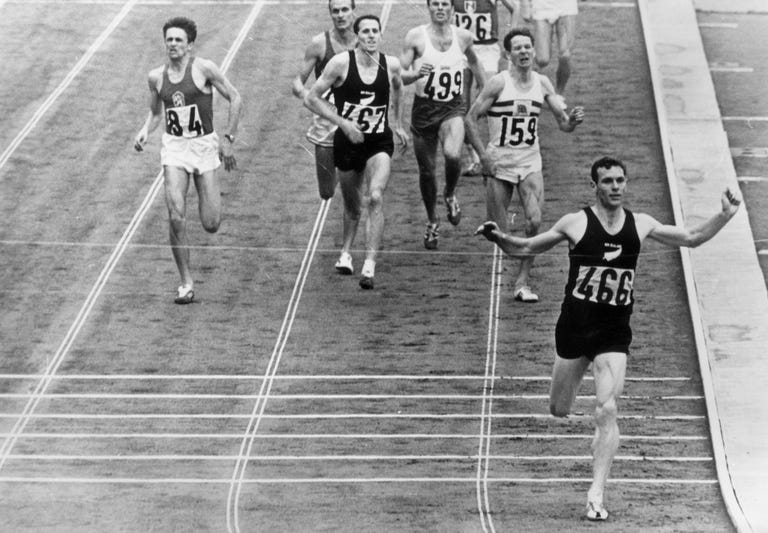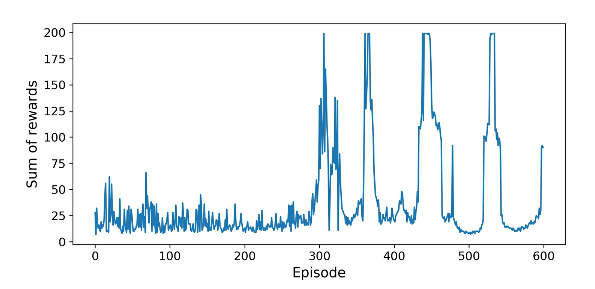The number 1 key to continuous, year to year improvement:
Avoiding 'Catastrophic Forgetting'

"Those who cannot learn from history are doomed to repeat it." -- George Santayana
At the end of most previous years, I've written a post about "what I learned this year" - the key observations & lessons that I intend to take forward, the key mistakes that I resolve to not repeat. Pertinent to this post, I write this stuff down, first and foremost, so my aging brain doesn't make the same mistakes twice, so I don't forget!
This previous year, 2019, like most before it, was a mixed bag of good and bad performances. However, there was a new emerging, common theme when it came to the 'bad' performances this year that stuck out to me like a sore thumb, given my other current passion of Machine Learning. It seems that both humans and machines are subject to the same curse: Catastrophic Forgetting.Catastrophic forgetting is a key concept in Machine Learning that, it turns out, is equally applicable to Human Learning. As explained by Wikipedia:

When I train a Neural Network, specifically in this case, a Deep Reinforcement Learning Network, I will often see the following pattern (image from the great ML book "Hands on Machine Learning" by Aurelien Geron)...

Slow improvement at the start as the Machine learns what's going on and then, bam(!), a breakthrough when it figures it out. But then, just as we're thinking that the machine has learned the problem, all of a sudden it forgets everything that it has learned and we're back to the proverbial drawing board! This pattern is common in all complex networks with a memory and represents a phenomena known as the stability-plasticity dilemma, i.e. we want a 'brain' that is stable enough to hold onto the useful information from the past but also plastic or 'moldable' to new, better, information from the future. Again returning to Wikipedia...
"Specifically, these problems refer to the issue of being able to make an artificial neural network that is sensitive to, but not disrupted by, new information."
This characteristic is equally true for successful athletes as it is of successful machines...
If you've been in the sport long enough, I'm sure you've seen a similar pattern when training athletes: After years of plugging away, the athlete will have a breakthrough season but then, just as certainly, will forget all that they've learned and come crashing back to earth. While 'catastrophic' might be a little dramatic, it's certainly not a good feeling to be riding high on top of your athletic world one season, full of optimism for what's to come, and then pulling out your hair trying to figure "what went wrong?" the next.
In the modern context of (mis)information being fed to athletes at every portal they encounter, it should come as no surprise that many athletes fall a little too far on the 'moldable' side of the stability-plasticity dilemma & tend to often forget those critical things that made them good. They tend to lose clarity on just what they were doing in their best years & instead, at times of frustration, rather than reflecting on time-tested strategies, go looking for the newest, latest, greatest information that they have been 'missing all along'. In absorbing this new information, there is an all too often tendency for it to push out the important memories of what made them good in the past!
In my opinion, based on my 25 years experience in coaching, boring as it may be, the surest route to continuous year-to-year improvement is to start each and every season by reflecting on and prioritizing the things that have worked in the past, i.e. retaining a certain stability to the training.
Now, I know this is a less 'exciting' way of doing things. Many years ago I witnessed the stability-plasticity dilemma first hand as a Personal Trainer in a large fitness center that had a unique mix of NSCA and NASM certified trainers. At the risk of offending, NSCA (the National Strength and Conditioning Association) represented the stable, dare I say, boring, approach. Trainers who followed this paradigm, generally stuck with a small amount of exercises and adopted a systematic, progressive approach to loading. The NASM (National Academy of Sports Medicine) trainers, on the other hand, incorporated a lot of different exercises and different modalities to keep things 'fun', constantly coming up with new and inventive ways to do things. Often, prioritizing inventiveness and 'fun' over continuous, steady improvement. Now, before I get any hate mail, after going through both certifications, I can say that when the NASM approach is done well, it does incorporate a systematic & steady progression. However, the flexibility of the approach causes many to miss the forest for the trees. The larger point of my analogy being, the 'fun' trainers did well commercially, but it was the 'stable' trainers who had stable, constantly improving clients. One look at Triathlon today and it is clear to see that we are in exactly the same position as the Fitness industry was 20 years ago: With a palpable conflict between what's 'fun' & what works!
In this day and age, there are many 'fun' tools and approaches to try. Each with no shortage of Instagram marketing telling you all of the improvement that you're going to get if you simply swipe up. It's tempting I know. Even if things have been going well, there's always this desire for 'new', 'different', 'exciting' that shows itself, especially at the start of a new year/season. My advice to you would be: Don't swipe up. Avoid that unconscious reflex. Systematically, *remember* what has worked for you in the past and start with that. This principle of remembering what has worked applies across the board: Training, Nutrition, Work, Life.
Now, a word of warning, sometimes memories are painful. Sometimes we avoid looking back to what we were *really* doing 10 years ago when we were at our fittest and fastest simply because, it was a lot! Many of the successful athletes that I've worked with have this tendency to go "all in" especially when starting something new. They nail every session, every week for weeks on end, leading to impressive starting years that can be difficult to replicate. As difficult as this memory of what you were really doing in your best years might be to think about, it doesn't make it any less true:You were probably more committed, more serious in the years that you were at your best. Getting back to a position closer to that point won't come from time spent looking for the latest and greatest in internet forums or on Insta. It will come from a real deal reality check of looking back on those training logs & your life at that point and considering, what was motivating you in those years to train like a badass?
This is not to say that you should never sample anything new, merely to say, prioritize what has worked and keep the 'latest and greatest' in context. If in doubt, *remember* history...
While the trends in training cycle back and forth from year to year, the truly big developments are few and far between. If in doubt, take a look at the New Zealand track records. Despite all of the 'advances' in training, all of the scientific studies that have been completed since the 1960's, all of the technology that has been introduced every year, the late, great Peter Snell *still* holds the National 800m record with a time of 1:44.3 that he set in 1962. Almost 60 years ago! He set this record with a simple, steady, stable, dare I say, boring, diet of consistent high volume training - The Lydiard Method. Let's not forget that. Look a couple of spaces down and you'll see Bill Baillie with records still standing from 1963. Including the 1 hour record of 20.19km. Not for nothing, they had the same coach & used the same consistent year to year approach - a big base of aerobic mileage, then hill work, then a short period track work, then (very fast!) races. Year after year, after year. Nothing fancy, just consistent, long term work, each year building on the last, & trusting in the process.
So, my top tip for the year is a surprisingly simple one: Take the time to Remember. Take the time to distance yourself from all of the noise and truly reflect on what has worked for you in the past. Look at those log books, look at the lessons from history & start there. And, whenever, a new forum, Insta or Twitter post is getting your attention, just make sure it's not pushing out any of the truly important stuff from your 'network'.
Train Smart
AC
TweetDon't miss a post! Sign up for my mailing list to get notified of all new content....
